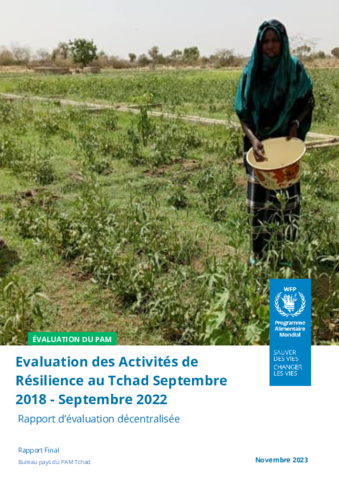
It focused on assessing relevance, effectiveness, efficiency, coherence, sustainability, and impact through a specific methodological approach which is the QUIPP: Qualitative Impact Assessment Protocol.
Overarching evaluation questions included:
- To what extent was the intervention design relevant to the country context and people needs?
- To what extent has WFP fostered coherence with other players?
- To what extent have FFA resilience activities helped to strengthen household and community resilience?
- Were there any unexpected effects on the local communities?
- How sustainable are the results of FFA resilience activities likely to be?
Key evaluation findings included:
- The design of resilience activities was relevant to the needs of the beneficiaries given the choice of assets has been made during PCPs or community consultations. This approach enables the various social categories in the communities to express their needs and agree on the assets that can meet those needs. However, NGO partners do not always master the participatory techniques needed to help beneficiaries analyse the causes of their difficulties and find appropriate solutions.
- The program has contributed to strengthening the resilience of beneficiary communities to irregular rainfall/drought, mainly through the development of market gardening sites and improved access to water for irrigation.
- Household resilience (capacity to absorb, adapt and transform) has been strengthened by the program, notably through asset creation, encouragement to form producer groups and training in production and composting techniques. These interventions have helped to increase and diversify production, increase, and diversify the products sold, and develop solidarity. The result has been easier access to credit, improved food security, nutrition, and livelihoods.
- The program has had a positive impact on strengthening solidarity with vulnerable households as well as on enabling women to contribute to household expenses or pay labor for domestic tasks, as a result of increased income. Another unexpected effect is the reduction of youth migration , thanks to the conditional cash transfers (CBT).
- Some of the assets created with program support are likely to be sustainable: this is the case for hydro-agricultural developments, new crops (mainly market gardening) and composting. Factors favouring sustainability are training/awareness-raising; the motivation of beneficiaries to maintain the asset; the availability of the means required for maintenance, and, to a lesser extent, the mutual assistance fostered by the formation of groups.
Key recommendations from the evaluation included
R1: Complement the 3PA approach with an anticipatory approach to develop the resilience-building strategy.
R2: Strengthen coordination with other UN agencies to remove constraints to meeting the needs of the population.
R3: Ensure that no community is "left behind" through the monitoring system to ensure that each community benefits from resilience-building assets, notably a market garden site (when agronomic and technical conditions are met), which is the most effective asset.
R4: Adopt a participatory approach to determine which household assets to promote.
R5: Increase irrigation system capacity and productivity.
R6: Further strengthen support for producer groups.
R7: Extend Income Generating Activities development support to vulnerable groups.
R8: Consider longer-term contracts with implementing partners.
R9: Develop indicators to assess the program's impact on women's empowerment.
R10: Reformulate the indicators for activity 7 to measure the results and effects more effectively, so as to provide data to guide the resilience-building strategy.
R11: Strengthen the sustainable capacities of partner NGOs in methodological areas such as participatory approaches and project monitoring
